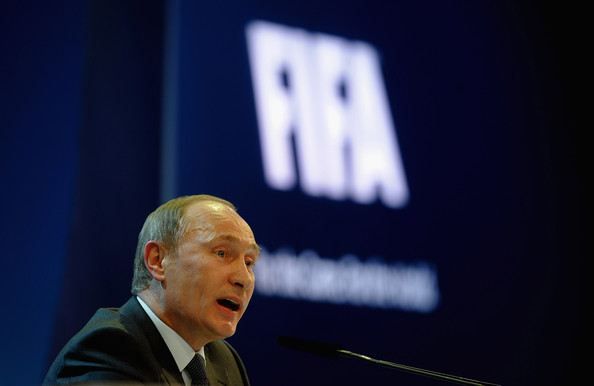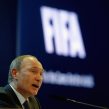
Putin Markets Russia Globally as his Success Story: International Events Highlight Internal Development
Publication: Eurasia Daily Monitor Volume: 7 Issue: 223
By:

The decision by FIFA to grant Russia the right to host the 2018 Football World Cup was met with enthusiasm within the country and with sobering comments around the world (EDM, December 6). Prime Minister, Vladimir Putin, a driving force behind Russia’s effort to host international events, is determined to turn them into marketing channels to sell Russia to the world as a success story of rapid economic development. But to deliver on the promises, the mobilization of resources might harm the country’s political and social development, as has been the case in the past.
Russia is to host the 2013 World Athletics Championship in Moscow, the same year as the University Games in Kazan, as well as the 2014 Winter Olympics in Sochi, the 2018 World Cup, and the 2014-2020 Formula One Grand Prix in Sochi. The main concern is the development of infrastructure, from sport facilities to transportation and hospitality services, most of which are non-existent. According to Putin, the cost of the Winter Olympics would amount to 1 trillion rubles ($32.3 billion), the World Cup to 300 billion rubles ($9.68 billion), while experts estimate the investment required to be ten times higher. The prime minister has made it clear that he would use all his powers to mobilize Russia’s resources to meet high international standards, making big business share the costs. In the wake of the FIFA decision, the shares of the Russian building and metallurgical companies increased.
(https://www.vesti.ru/doc.html?id=411798&tid=73733)
Putin was personally involved in winning the tenders for these high-profile sports events, as the extensive construction needed for their realization coincides with his plans for large infrastructure projects initiated while he was still president. As prime minister, Putin’s association with infrastructure development has become more pronounced, as in their communication with the population the duumvirate have divided their “sphere of influence,” with President Dmitry Medvedev’s image being built on the slogans of modernization, innovation, and “perfecting democracy” (EDM, October 25 December 1).
Putin has connected Russia’s internal development projects to these international events as if to hedge risks against inertia. Sport venues punctuate the advanced programs of the pre-Urals territories, while the 2012 APEC summit in Vladivostok sets a time frame for the initial stages in the development strategy for the Russian Far East up to 2020. The preparations for the APEC summit, 48 new facilities, including a university, a conference complex and a transport network, will cost over 550 billion rubles ($17.76 billion). A video system has now been installed on the construction sites to control the process from the regional capitals and Moscow.
(https://novostivl.ru/msg/10712.htm)
Putin has inspected the region personally as he drove 2,000 kilometers in a Russian-made Kalina car on the newly built Chita-Khabarovsk highway last August. The prime minister has also used his authority as the leader of the ruling United Russia party to check on the realization of the Strategy-2020 national development program in all eight federal districts, as he attended four party inter-regional conferences, with four more to follow (Kommersant, December 6).
With his focus on the country’s production, transportation and logistics, particularly new oil and gas pipelines, Putin has acted as a corporate executive. At the time of his “appointment” as Boris Yeltsin’s successor, Russia seemed to be an almost bankrupt, but potentially promising corporation, in need of a crisis manager. In a similar situation in the business world, a crisis manager would secure the support of the board of directors for his policies, gather a new management team, suppress any sabotage or opposition, streamline the corporate structures to build the large production centers and an effective sales network, and use his powers to standardize business processes in order to stimulate employees to perform. This process is similar to what Jack Welch, dubbed a neutron bomb for firing employees on his visits to the company’s branches, but leaving the buildings intact, was doing as he dismantled the previous management system within a year of becoming the CEO of General Electric in 1981.
From a Russian standpoint, what Mikhail Khodorkovsky did when he, having bought the oil company Yukos at the assets-for-credits auctions in 1995, started turning it into a vertically integrated, strictly managed and tightly controlled (with an ex-KGB general Aleksei Kondaurov as the head of its analytical department) corporation.
(https://www.izvestia.ru/investigation/article3093561/?print)
Putin might not have known much about Jack Welch’s practices, but he certainly learned enough about Khodorkovsky’s methods, especially in the public relations field, as Putin’s main propaganda adviser, Vladislav Surkov, had started his career at Khodorkovsky’s first entrepreneurial venue in 1987 and continued at his Menatep bank and an affiliate company Rosprom until 1997.
(https://archive.kremlin.ru/state_subj/27815.shtml)
Crisis management produces results within a short period of time, but a company becomes dependent on the will and determination of one person. The next step is to assure a smooth transfer from a “crisis” to “normal” corporate rule. By running Russia as a corporation, Putin secured its territorial integrity, stabilized its macroeconomy, and started to build large production units, big companies with a significant state participation to be noticed on the international markets. Russia’s political system, adapted to serve a new corporate rule, has stalled. Thus, Putin, a close aide to the former St. Petersburg Mayor, Anatoly Sobchak, one of the authors of Russia’s post-Soviet liberal transformation, found himself facing the risk of being known in history as a new Russian “autocrat.” Putin has launched what might be a smooth transfer of Russia to his younger protégé, Medvedev, whose modernization and liberalization agenda is guided by the same Vladislav Surkov, now Medvedev’s communications advisor.
A change in the management concept was more or less successfully related to the Russian and foreign audiences. Within Russia, the popularity ratings of both Putin and Medvedev remain high, but Putin’s image as Russia’s crisis manager has largely been lost on the foreign audience. Hence, Putin has been determined to show the results of his policies to the whole world by making Russia a focus of foreign media and visitors during international sports events and political summits. With the stakes so high, Putin will spare no effort to make these events success stories.
Russia has previously called for such strenuous mobilization to achieve ambitious goals: to industrialize its agrarian economy, to produce nuclear and thermonuclear weapons, to create a space industry, and to host the 1957 and 1986 Youth Festivals and the 1980 Olympic Games. However, the mobilization was always achieved at the expense of the population, its political freedoms and its social standards. History can repeat itself. Despite programs aimed at improving child care, healthcare, education, pension systems and at reforming the armed forces and police force, most Russians still have restricted access to an independent judiciary or quality civil services. The 2011 state budget was criticized for its paternalism as increased social expenditure is to be financed from reserves accumulated from rising raw materials’ prices, and by increasing taxes on business, including small ones, thus stifling individual initiative (Ekspert, October 25).
Most disturbingly, the larger the infrastructure project, the bigger its corruption component becomes. Thus, an inspection by the State Controlling Office revealed that the cost of building the Eastern Siberian oil pipeline, over 490 billion rubles ($15.82 billion) in total, was 34 percent overblown, but no criminal investigation ensued.
(https://vsesmi.ru/news/2768062/; https://navalny.livejournal.com/526563.html)
If the new infrastructure development only produces a number of better-off clusters around the foreign-visited cities, Putin’s role as Russia’s successful crisis manager would still be in doubt. After all, it is not simply modern infrastructure that denotes a country as a modern nation.




